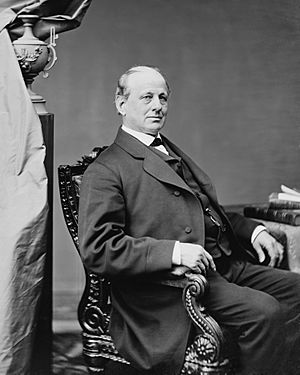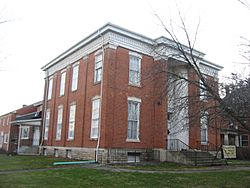Ralph Pomeroy Buckland facts for kids
Quick facts for kids
Ralph Pomeroy Buckland
|
|
|---|---|

Hon. Ralph Pomeroy Buckland of Ohio
|
|
| Member of the U.S. House of Representatives from Ohio's 9th district |
|
| In office March 4, 1865 – March 4, 1869 |
|
| Preceded by | Warren P. Noble |
| Succeeded by | Edward F. Dickinson |
| Member of the Ohio Senate from the 30th district |
|
| In office January 7, 1856 – January 1, 1860 |
|
| Preceded by | A. G. Sutton |
| Succeeded by | F. D. Parish |
| Personal details | |
| Born | January 20, 1812 Leyden, Massachusetts |
| Died | May 27, 1892 (aged 80) Fremont, Ohio |
| Resting place | Oakwood Cemetery, Fremont, Ohio |
| Political party | Whig Republican |
| Alma mater | Kenyon College |
| Signature | |
| Military service | |
| Allegiance | Union |
| Branch/service | United States Army Union Army |
| Years of service | 1862–1865 |
| Rank | |
| Unit | Army of the Tennessee |
| Commands | 72nd Ohio Infantry |
| Battles/wars | American Civil War |
Ralph Pomeroy Buckland (born January 20, 1812 – died May 27, 1892) was an important figure in American history. He served as a U.S. Representative for Ohio. He was also a brigadier general in the Union Army during the American Civil War. After the war, he worked as an executive for the Union Pacific Railroad.
Contents
Early Life and Political Beginnings
Ralph Buckland was born in Leyden, Massachusetts. When he was very young, his family moved to Ravenna, Ohio. He went to local schools and later studied at Tallmadge Academy and Kenyon College in Ohio.
After college, he studied law. In 1837, he became a lawyer, which means he was allowed to practice law. He started his law career in Fremont, Ohio. Ralph Buckland became the mayor of Fremont, serving from 1843 to 1845. He also represented the Whig Party at their big national meeting in 1848. Later, he served in the Ohio State Senate from 1855 to 1859.
Military Service in the Civil War
When the American Civil War began, Ralph Buckland joined the Union Army. On January 10, 1862, he became a colonel leading the 72nd Ohio Infantry regiment.
He commanded a group of soldiers called the Fourth Brigade. This brigade was part of William T. Sherman's 5th Division. They fought bravely at the Battle of Shiloh in April 1862. This was a very important and tough battle.
On November 29, 1862, Ralph Buckland was promoted to brigadier general of volunteers. During the Siege of Vicksburg in 1863, he led a brigade in Sherman's XV Corps. The Siege of Vicksburg was a long and difficult military operation.
Buckland left the army on January 6, 1865. He had been elected to the United States Congress. After the Confederate armies surrendered, he received an honorary promotion. He was made a brevet major general on March 13, 1865. This was a special honor for his service.
Life After the War and Public Service
After the Civil War, Ralph Buckland continued his public service. He was elected as a Republican to the Thirty-ninth and Fortieth Congresses. He served in Congress from March 4, 1865, to March 4, 1869. He decided not to run for re-election in 1868.
He went back to practicing law. He also attended important political meetings. In 1866, he was a delegate to the Philadelphia Loyalists' Convention. He also went to the Pittsburgh Soldiers' Convention.
In 1876, he was a delegate to the 1876 Republican National Convention. This is where the Republican Party chooses its candidate for president. From 1877 to 1880, he worked in the railroad business. He was a government director for the Union Pacific Railroad. In 1884, he was a Presidential elector for Blaine and Logan. This means he was part of the group that officially elects the President.
On December 1, 1879, Ralph Buckland helped start the Sandusky County Bar Association. This was a group for lawyers in his area. He was its first president for many years. He was also a very active member of St. Paul's Episcopal Church in Fremont.
Ralph Buckland passed away in Fremont, Ohio, on May 27, 1892. He was buried in Oakwood Cemetery.
Images for kids
 | John T. Biggers |
 | Thomas Blackshear |
 | Mark Bradford |
 | Beverly Buchanan |


